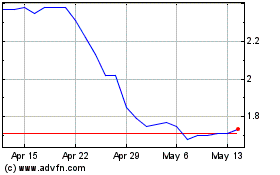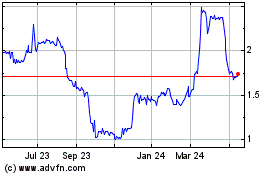Arch Biopartners Inc., (“Arch” or the “Company”) (TSX Venture: ARCH
and OTCQB: ACHFF), announced today it has submitted a Clinical
Trial Application to Health Canada to obtain permission to proceed
with a Phase II trial for LSALT peptide, targeting the prevention
and treatment of cardiac surgery-associated acute kidney injury
(CS-AKI). LSALT peptide is the Company’s lead drug candidate for
preventing and treating inflammation injury in the kidneys, lungs
and liver.
This application, and one recently submitted in
Turkey, follows the Company’s submission of an Investigational New
Drug Application to the U.S. Food and Drug Administration’s (FDA).
The FDA granted the Company permission to proceed with a Phase II
trial in late June.
The Phase II CS-AKI trial plans to recruit up to
240 patients and will be a double-blinded, placebo-controlled study
conducted in hospital sites in Canada, Turkey and the United
States.
Patient recruitment is expected to begin in
Turkey in early 2024, upon approval from the local ethics
committee. Patient recruitment will follow in Canada after
regulatory approvals and the onboarding of the first Canadian
clinical site. Sites in the U.S. may be added in future.
Once sites are active in the trial, patient
recruitment will be done on a competitive basis between sites,
until the planned total number of patients are recruited into the
study. This study is designed to produce a signal of safety and
efficacy that would support a larger Phase III trial, and
eventually the approval of LSALT peptide as a new pharmaceutical
product.
Quote from Richard Muruve, CEO of Arch Biopartners Inc:
“The clinical trial application submitted to
Health Canada is the result of clinical interest in Canada to
support our Phase II trial targeting CS-AKI. The Arch team and our
Canadian collaborators look forward to working together to test
LSALT peptide against the risks of AKI during by-pass cardiac
surgery, which is a large unmet medical problem.”
Cardiac Surgery-Associated AKI and LSALT
peptide
Cardiac surgery-associated AKI is often caused
by ischemia reperfusion injury (IRI) that reduces blood flow and
thus oxygen (ischemia) in the kidney causing kidney cell damage.
Once blood flow is restored to normal (reperfusion), inflammation
is triggered and injury to kidney cells is exacerbated. At present,
there are no therapeutic treatments available to prevent or treat
CS-AKI or IRI. In the worst cases of AKI, kidneys fail leading to
kidney dialysis or kidney transplant.
LSALT peptide has been shown to prevent ischemia
reperfusion injury (IRI) to the kidneys in pre-clinical models,
providing the scientific rationale for Arch to use LSALT peptide in
this CS-AKI trial.
Details of the Phase II trial, entitled “Phase 2
Global, Multicenter, Randomized, Double-Blind, Placebo-Controlled
Study of LSALT peptide for the Prevention or Attenuation of Acute
Kidney Injury (AKI) in Patients Undergoing On-Pump Cardiac Surgery”
can be viewed at clinicaltrials.gov.
The Science Advances publication, titled
“Dipeptidase-1 governs renal inflammation during ischemia
reperfusion injury” by Lau et. al. can be found at
the journal’s website.
Advisory services and a funding contribution
from the National Research Council of Canada Industrial Research
Assistance Program (NRC-IRAP) announced by the Company in March
2023, will significantly offset the costs of the CS-AKI Phase II
trial.
Incidence of Cardiac Surgery-Associated
AKI
Acute kidney injury (AKI) is a known common
complication in patients after coronary artery bypass grafting
(CABG) and other cardiac surgeries, including on-pump surgeries
which increase the risk of AKI. The reported prevalence of cardiac
surgery-associated acute kidney injury (CS-AKI) is up to 30% and is
independently associated with an increase in morbidity and
mortality.
Cardiopulmonary bypass (CPB) surgery occurs in
nearly 1 million patients per year. Approximately 0.6% to 5% of
patients undergoing cardiac surgery will require immediate
postoperative dialysis or renal replacement therapy, and these
patients have a very high early mortality rate up to 25% compared
with 1% to 2% in patients who do not require immediate
postoperative dialysis (Conlon et al, 19991, Chertow et al, 20052,
Zakeri et al, 20053, Ivert et al, 20144, Harky et al, 20205).
About Arch Biopartners
Arch Biopartners Inc. is a late-stage clinical
trial company focused on preventing inflammation and acute organ
injury. The Company is developing new drug candidates that inhibit
inflammation in the lungs, kidneys, and liver via the dipeptidase-1
(DPEP-1) pathway and are relevant for common injuries and diseases
where organ inflammation is an unmet problem.
For more information on Arch Biopartners'
science and technologies, please visit:
www.archbiopartners.com/our-science
For investor information and other public
documents the company has also filed on SEDAR, please visit
www.archbiopartners.com/investor-hub
The Company has 62,755,633 common shares outstanding.
References:
1. Conlon PJ, Stafford-Smith M, White WD, et al. Acute
renal failure following cardiac surgery. Nephrol Dial
Transplant. 1999;14:1158–62
2. Chertow GM, Burdick E, Hoinour M, Bonventre JV, Bates DW.
Acute kidney injury, mortality, length of stay, and costs in
hospitalized patients. J Am Soc
Nephrol. 2005;16:3365-70
3. Zakeri R, Freemantle N, Barnett V, et al. Relation
between mild renal dysfunction and outcomes after coronary artery
bypass
grafting. Circulation. 2005;112(suppl):I270–5
4. Ivert T, Holzmann MJ, Sartipy U. Survival in patients
with acute kidney injury requiring dialysis after coronary artery
bypass grafting. Eur J Cardiothoracic
Surg. 2014;45:312–7
5. Harky A, Joshi M, Gupta S, et al. Acute kidney
injury associated with cardiac surgery: a comprehensive literature
review. Braz. J. Cardiovasc. Surg.
2020;35(2).
Forward-Looking Statements
This press release contains forward-looking
statements within the meaning of applicable Canadian securities
laws regarding expectations of our future performance, liquidity
and capital resources, as well as the ongoing clinical development
of our drug candidates targeting the dipeptidase-1 (DPEP-1)
pathway, including the outcome of our clinical trials relating to
LSALT peptide (Metablok), the successful commercialization and
marketing of our drug candidates, whether we will receive, and the
timing and costs of obtaining, regulatory approvals in Canada, the
United States, Europe and other countries, our ability to raise
capital to fund our business plans, the efficacy of our drug
candidates compared to the drug candidates developed by our
competitors, our ability to retain and attract key management
personnel, and the breadth of, and our ability to protect, our
intellectual property portfolio. These statements are based on
management’s current expectations and beliefs, including certain
factors and assumptions, as described in our most recent annual
audited financial statements and related management discussion and
analysis under the heading “Business Risks and Uncertainties”. As a
result of these risks and uncertainties, or other unknown risks and
uncertainties, our actual results may differ materially from those
contained in any forward-looking statements. The words “believe”,
“may”, “plan”, “will”, “estimate”, “continue”, “anticipate”,
“intend”, “expect” and similar expressions are intended to identify
forward-looking statements, although not all forward-looking
statements contain these identifying words. We undertake no
obligation to update forward-looking statements, except as required
by law. Additional information relating to Arch Biopartners Inc.,
including our most recent annual audited financial statements, is
available by accessing the Canadian Securities Administrators’
System for Electronic Document Analysis and Retrieval (“SEDAR”)
website at www.sedar.com .
The science and medical contents of this release
have been approved by the Company’s Chief Science Officer
Neither TSX Venture Exchange nor its Regulation
Services Provider (as that term is defined in the policies of the
TSX Venture Exchange) accepts responsibility for the adequacy or
accuracy of this release
For more information, please contact:
Richard Muruve
Chief Executive Officer
Arch Biopartners, Inc.
647-428-7031
info@archbiopartners.com
Arch Biopartners (TSXV:ARCH)
Historical Stock Chart
From Dec 2024 to Jan 2025

Arch Biopartners (TSXV:ARCH)
Historical Stock Chart
From Jan 2024 to Jan 2025
